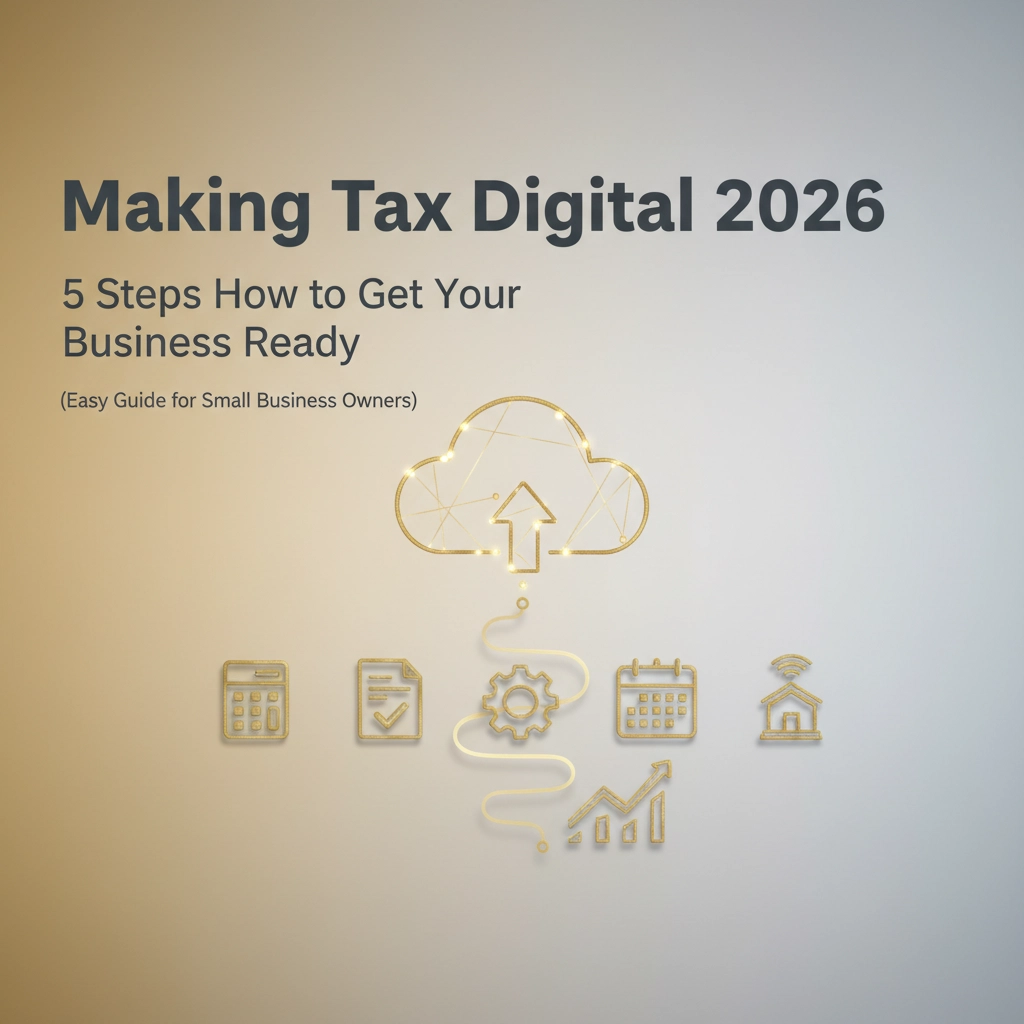The April 2026 Making Tax Digital deadline is fast approaching, and many small business owners are still unsure about what they need to do. With less than five months remaining, now’s the perfect time to get your business ready for this significant change in how you’ll handle your tax affairs.
Making Tax Digital (MTD) isn’t just another government initiative: it’s a fundamental shift that will affect how you keep records, report income, and interact with HMRC. The good news? Getting ready doesn’t have to be overwhelming if you break it down into manageable steps.
Let’s walk through exactly what you need to do to ensure your business is fully compliant and ready for the transition.
Step 1: Determine If Your Business Needs Making Tax Digital
Start by calculating your qualifying income. This is crucial because MTD requirements depend on your income thresholds, not your total business turnover. For sole traders, qualifying income includes profits from self-employment. For landlords, it’s rental income after allowable expenses.
The phased rollout means different businesses will be affected at different times:
- April 2026: Businesses with qualifying income over £50,000
- April 2027: Threshold drops to £30,000
- April 2028: Threshold drops to £20,000
Use HMRC’s online checker to confirm your status. Even if you haven’t received a letter from HMRC, it’s your responsibility to check whether you need to comply. The government provides a specific tool to help determine your obligations and timeline.
If you’re unsure about your qualifying income calculation, this is where professional guidance becomes valuable. Getting this step wrong could mean missing your compliance deadline or preparing unnecessarily early.
Consider potential exemptions carefully. HMRC recognizes that some businesses may be “digitally excluded”: unable to reasonably use digital systems due to age, disability, or geographical constraints. However, these exemptions are limited and require formal application.

Step 2: Understand What Making Tax Digital Actually Requires
The two core requirements will change how you operate. First, you must maintain digital records of all business income and expenses. This means no more shoebox accounting or manual spreadsheets that aren’t connected to your tax submissions.
Second, you’ll submit quarterly updates to HMRC instead of the traditional annual Self Assessment. These updates are due by the end of each quarter plus one month, with your final annual submission due by January 31st.
Digital record-keeping has specific standards. Your records must be kept in a digital format that can directly feed into your tax calculations. This doesn’t mean simply scanning paper receipts: though that’s part of the process. Your accounting software needs to create a clear digital trail from every transaction to your tax return.
The quarterly reporting requirement means you’ll have much better visibility of your tax position throughout the year. Instead of a shock in January, you’ll know exactly where you stand every three months.
Penalties for non-compliance are significant. HMRC can impose financial penalties for late submissions or inadequate record-keeping. The quarterly nature of reporting means there are more opportunities to fall behind if your systems aren’t properly set up.
Step 3: Choose and Implement MTD-Compatible Software
Software selection is critical because manual processes won’t work. You cannot meet MTD requirements using traditional spreadsheets or paper-based systems. Your chosen software must be able to communicate directly with HMRC’s systems.
When evaluating options, consider these essential features:
- Direct bank feed integration to capture transactions automatically
- Receipt capture through mobile apps
- Automatic VAT calculations if applicable
- Multi-device access for flexibility
- Backup and data security features
Consider your current processes before choosing. If you currently use an accountant who manages everything manually, you’ll need to discuss how MTD affects your working relationship. Some businesses find it beneficial to take more control of their bookkeeping, while others prefer their accountant to manage the new digital systems.
Popular MTD-compatible options include Xero, QuickBooks, Sage, and various other specialized platforms. Each has different strengths depending on your business type and complexity.
Plan for data migration and training. Moving from your current system to MTD-compatible software requires careful planning. You’ll need to transfer existing data, train yourself or your team on the new system, and ensure everything integrates smoothly with your business processes.

Step 4: Organize and Digitize Your Financial Records
Start with a complete audit of your current record-keeping. Gather all receipts, invoices, bank statements, and expense documentation from your current tax year. This gives you a clear picture of what needs to be digitized and how much work lies ahead.
Create a systematic approach to document management:
- Scan all paper documents into clearly labeled digital folders
- Organize by category (income, expenses, assets, etc.)
- Ensure document quality so they’re readable and audit-ready
- Create backup copies in cloud storage for security
Establish ongoing processes for new documents. The real benefit comes from creating habits that maintain organized digital records going forward. This might mean taking photos of receipts immediately, setting up automatic bank feeds, or scheduling weekly bookkeeping sessions.
Don’t forget about historical data requirements. HMRC requires you to keep business records for five years after the 31 January submission deadline of the relevant tax year. This means your digital system needs to accommodate historical data storage and retrieval.
Consider investing in receipt management apps that can photograph and categorize expenses automatically. Many integrate directly with popular accounting software, streamlining the entire process from purchase to tax return.

Step 5: Register for Making Tax Digital and Test Your Setup
Early registration allows you to test everything before it becomes mandatory. HMRC encourages voluntary early adoption, which gives you valuable experience with the system when there’s still time to resolve issues.
The registration process involves:
- Signing up through your Government Gateway account
- Connecting your MTD-compatible software
- Verifying your digital records are properly formatted
- Completing practice submissions to ensure everything works
Run through complete quarterly submission cycles. Don’t just register and wait: actually practice the entire process of gathering quarterly data, preparing your submission, and sending it through your software to HMRC. This identifies any gaps or problems in your workflow.
Establish your quarterly calendar and reminders. Mark your quarterly submission deadlines clearly in your business calendar. Set up automatic reminders well in advance so you’re never scrambling at the last minute. Remember, each quarter’s deadline is one month after the quarter ends.
Plan for ongoing support and troubleshooting. Whether you’re managing MTD yourself or working with an accountant, ensure you have access to support when issues arise. This might mean choosing software with robust customer service or arranging additional support from your accounting professional.
Getting Professional Help When You Need It
Many small business owners find the transition to Making Tax Digital manageable with the right preparation and tools. However, complex business structures, multiple income sources, or uncertainty about compliance requirements might warrant professional assistance.
At Penny’s Bookkeeping Services, we help businesses navigate the MTD transition smoothly, from software selection to ongoing compliance management. Whether you need full bookkeeping support or guidance through the setup process, having expert help can save time and ensure compliance from day one.
The key to MTD success is starting your preparation now rather than waiting until the April deadline approaches. By following these five steps over the coming months, you’ll position your business for seamless compliance and improved financial management that extends well beyond tax requirements.




